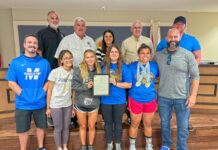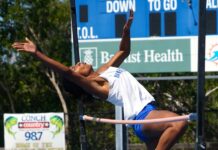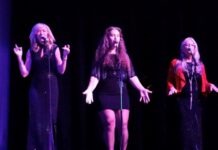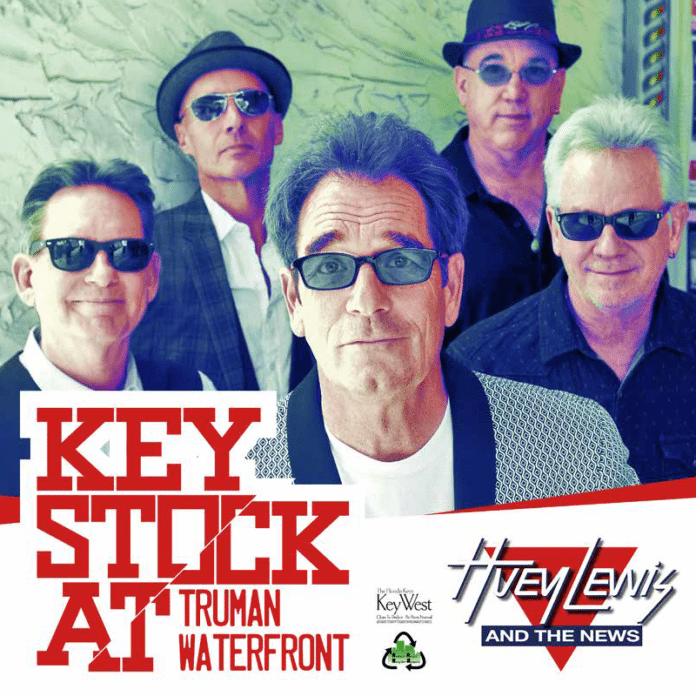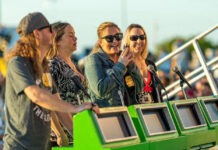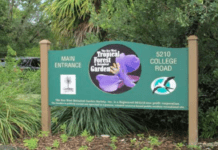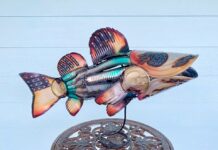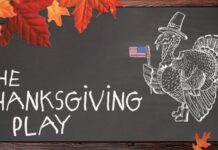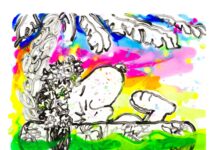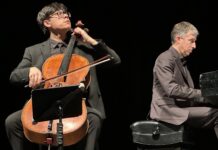Weekly has candid conversation with rock star
There are rock stars—and then there are ROCK STARS. Huey Lewis is the latter. Long before overnight sensations were discovered on YouTube and bred in fashionable aridness on reality shows — a class of timeless musicians emerged in the early ’80s, forging an enduring troop of MTV and Top 40 practitioners unlike anything since. And he’s coming to Key West on Saturday, April 2 to perform at Keystock, an outdoor concert at Truman Waterfront.
Among the timeless genres and stylistic paradoxes that emerged from that era, names such as Sting, Steven Tyler and Springsteen all carried an inexorable torch into future generations of music. Yet it was Huey Lewis who was, and still is, the enigma of legendary rock ‘n’ roll stars.
Not only did Lewis’ clean-cut persona (even today he has no tattoos) allow him to relate to any household across the globe, he was also able to fuse the sounds of three of the most prominent decades of music (’50s, ’60s and ’70s) into his melodic DNA.
Today Huey Lewis is one of the most recognizable faces (and voices) in the world. With sincere elegance and humility, Lewis will tell you it was all timing. Not only did he govern the television screen at a time when MTV dictated pop progression, he and his band set the standard for movie soundtracks with their hit “The Power of Love,” which brilliantly integrated into the timeless success of “Back to the Future.”
But Huey Lewis is so much more than MTV and his successful crossover into acting. By now, the story of him dropping out of Cornell (he scored a perfect score on the math segment of his SAT) and touring across Europe with a harmonica is almost as legendary as his band’s third LP, “Sports,” which still serves as one of the best selling albums ever released. And from there, the awards and accolades are endless for a career that has spanned five decades.
So on the eve of what might be the biggest concert to ever take place in the Southernmost City, the Keys Weekly caught up with Huey Lewis from his home in Montana—where the Rock icon touched on everything from his love of baseball, his timeless sound and what to expect at this year’s Keystock Festival in Key West. For limited tickets to Saturdays Keystock Festival, call 305-745-1079.
KW: [phone rings; casually, as I expect the normal routine of a publicist briefing me on a few rules before patching me through] Good morning, this is Britt.
HL: Britt, this is Huey Lewis.
KW: I apologize for being so casual. I was expecting your publicist.
HL: [laughing] I can hang-up and have them call you back if you like? But I thought this was Key West for Christ’s sake. I thought you guys didn’t care about that stuff.
KW: Ok, well I’m caught off guard, so please allow me to place my earphones in so you can hear me better.
HL: No, that’s actually so you can hear me better, Britt.
KW: Okay, know that I did my homework. I’m not trying to match wits with you here. I already know about the perfect math score on your SAT’s and your stint at Cornell. Just tell me how much time I have…10 or 15 minutes.
HL: [Laughing] Anything is fine.
KW: You’re a huge rock star. You’re not supposed to be so cool and give me free reign.
HL: [still laughing] You’ll find that I’m very accommodating that way.
KW: Okay, let’s get to it. Have you been to Key West before and what are you plans here aside from the Keystock show?
HL: We’ve been down there a little bit. We’ve played a few shows, but like private stuff. I don’t think we’ve done anything there publically. But I’m coming down a day early to tarpon fish so that should be really fun. [Huey is a fly fisherman.]
KW: Let’s get one question out of the way. I know you’re a huge 49er guy. Is Chip Kelly the answer for San Francisco?
HL: I hope he’s part of the answer but I don’t think any one guy is the answer. They have some rebuilding to do so we’ll see. But they don’t’ call me up to see what I think. But I just got back from spring training with the Giants — because Bruce Bochy is friend of mine and baseball is what we’re thinking about right now. We’ve got the Giants who we’re so proud of and Bruce Bochy is probably the best manager in baseball and the Giants are just a great bunch of guys.
[We talk baseball for another 5 minutes. Huey is picking the Cubs and Giants in the NLCS in 2016 and brings up his good friend Rick Sutcliffe who he was just hanging with at the Cubs complex. We digress into music.]KW: When anyone interviews you it’s mandatory to talk about the hits that are second nature to anyone who loves music such as “The Power of Love” and the “Sports” LP that contained “Heart and Soul,” “I Want a New Drug” and “If This is It.” But do you have any B-Side songs that you felt defined you guys but did not receive the same acclaim as your chart toppers?
HL: Sure and that’s a very good question. There are some songs on the side two of albums that aren’t talked about as much, but here are also some songs that we never recorded that we just demo-ed. Two or three of the best songs we have ever written, I think, just don’t work for us some how. We have one called “So Little Kindness.” And there are a bunch of those. And you never really know which ones of those, in our day, are going to be ‘the hit.’
KW: Why did some songs stick and others not? Was it the era?
HL: The hit thing is so much different today. In our day it was a radio world. No jam band, no Internet — everything was programmed to Top 40. So that was it. You needed a hit record or you did not exist. So we insisted on producing the records ourselves because we wanted to make those crucial commercial decisions ourselves.
KW: How was that approach different in the early ‘80s than today.?
HL: So we aimed, on every track of the “Sports” album, at radio. Even MTV was playing an exact rep of the radio playlist. They were playing videos in rotation of the radio. And we new we needed a hit record to exist, but we didn’t’ want to repeat ourselves. One [song] is kind of rocker, one is kind of a ballad and we knew we needed a hit. We just didn’t know we were going to have six of them.
KW: So why is “Sports” so timeless?
HL: When I look back at our “Sports” album from ’83, it’s a record of its time. It’s a collection of singles. And that’s what the world was about back then. Even FM Radio, which started playing anything and everything; by 80 it was completely programmed — CHR (Contemporary Hit Radio). When push button radio came along, Top 40 Radio was really more like Top 23 radio. These stations were really playing 23 records in varying rotations. If you were number 23, you got two plays a day. If you were number three, you got eight plays a day. And that was the game in 1980 for everybody. And then of course Coran Capshaw and Dave Matthews kind of broke that mold and it was a mold ready to be broken.
KW: Did the radio world of music benefit your style as a band?
HL: Interestingly it was one of our biggest challenges as a band. We are kind of steeped in rhythm and blues and other stuff. We weren’t coming from pop necessarily. That was the challenge for us, to actually make songs that sounded commercial, with a singer that actually sounded as rough as I did [laughing]. But that was our greatest achievement, because we did it all ourselves. And we became a Top 40 pop band, which is hilarious because at our core we are anything but a pop band.
KW: But you seem to now have the best of both worlds. You speak to so many generations of music fans and your considered one of the greatest rock guys of all time. Yet, you also have this clean-cut persona, intelligent and no tattoos that probably wouldn’t work for someone starting out today. How do you explain this phenomenon?
HL: We are an audio band. We started pre-MTV by two years. Now had we come up maybe five years later, I might be tattooed head to foot. But it was just an audio thing for us and it wasn’t so much about what we looked like. And the other thing … my dad was a hobbyist jazz player. And, interestingly, most of our fathers [in the band] were music fans and amateur players. And it proves another theory of mine that a lot of people take their father’s hobby and make it their profession. But in any case, our parents listened to jazz and traditional music, which was written to be timeless. In other words, it was never supposed to be age appropriate. We were always trying to write stuff from that older era of ageless stuff.
KW: So how do you explain the idea of being timeless to some extent? You have a following of older fans, but still have mass appeal to a newer generation.
HL: A lot of our songs actually fit better today, in our ripe old age, than in our 20’s. We were kind of old fashioned then so we’ve grown into it better in a way. And the other thing is we are from the Bay area and we’ve always written and produced our own stuff. So we’ve always maintained that homogeneity of northern California, stay out of the mainstream and do our own thing. And that’s what resonates.
KW: You made a joke about your voice earlier, but the truth is you’re known as a guy who truly has one of the unmistakable voices in music. With this in mind, people always see the finished product of Huey Lewis and The News on stage or on television these days and I’m wondering if you guys still have to work on your sound or is it just second nature at this point?
HL: Really good question. Because it isn’t easy singing two hours a night at my ripe old age, doing 70 shows a year. But yeah, we obviously look after ourselves better. We get a lot more sleep these days [laughing] than we used to, but more than that, I’m a smarter singer. Because I know how to pick spots and I’m actually still improving. I don’t have the range that I once had, but I’m smarter and my note choices are a little better I think. And I’m still learning. And the thing about the voice is as long as you keep using it, because it’s a muscle obviously, that works, but we do a lot of playing rather than rehearing. But we work a lot. We rarely take two weeks off without working and have for years and years—for 30 years now.
KW: How is touring today than it was 25 years ago? What kinds of things can you step back and appreciate more today than you could then?
HL: Our joke is, when we are waiting in the security line at the airport, I say to the guys, ‘I can’t wait to retire. You know what I’m going to do—just travel.’ That’s our gag. The notion of retiring and traveling is hilarious to us, because the travel is the hard part. And the thing that breaks bands up is the other 22 hours. It’s not the two hours on stage. That’s why we bring our golf clubs and fishing rods when we travel.
KW: One cliché question. When “The Power of Love” was chosen as the theme for “Back to the Future,” how did that change the landscape for the band?
HL: Well you have to know the song was released before the movie. Know that the “Power of Love” was already number one. In fact, I think the movie premiered the week “The Power of Love” was number one. What the song did for us was it became our first big international hit and allowed us to tour Europe and Asia [and so on].
KW: At this point you’ve been in dozens of movies and television shows, most recently “Hot in Cleveland.” Was “Back to the Future” you intro to the movie business as a whole and is that what sparked your interest in acting?
HL: Britt, I’m in show business so I’ll do anything for attention or money. Usually in that order.
KW: So do you get more comments on “Short Cuts” or “Back to the Future?”
HL: More on “Back to the Future.” But “Short Cuts” was great … working with Altman was amazing. That was really fun and he’s an amazing guy. It was an amazing cast and amazing experience.
KW: You’ve played with almost every name in music. Who is someone that really stands out or made you take a step back and appreciate the moment?
HL: My favorite of all time, I sat in with Stevie Wonder. My neighbor Charles Schwab had a birthday party and I got to sit in with [Wonder] and he was unbelievable. He was just so gracious and so cool. He asked me to sit in and play a little harmonica. I played a couple courses and then he took out his chromatic and took it to another level during the rehearsal. And then in the gig, I was on board to emcee and intro and then Stevie invites me up to jam. So I play my two courses and he pulls out his chromatic, real simple — just to make me look good. What a man. What a stud.
KW: How about contemporary guys, which most you’ve probably influenced to some degree … are there any you listen to these days?
HL: There’s a jam band called Umphrey’s McGee and we’ve become friends and they are very talented. But I listen to all kinds of stuff. Marc Broussard is great and I’m a big fan of his. He’s opened for us and I’ve become big on him as well.
KW: Last question and pardon the “Back to the Future” pun, but what would Huey Lewis today tell Huey Lewis in 1985?
HL: Relax. It’s gong to workout ok. Just relax.







